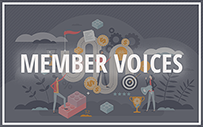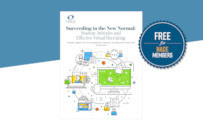
What do Class of 2025 college graduates want most in a job? According to NACE’s annual student survey, they are looking for stability. They also would like a healthy workplace culture and friendly coworkers.

Hybrid and in-person remain the preferred work modalities of employers for both their overall and entry-level positions, which matches the ways students prefer to work, NACE research has found.

LinkedIn can be a valuable tool for students preparing to enter the workforce, but it can also cause students to miss out on opportunities if not used responsibly.

By using a gamified approach to career development, college career services can create scenarios that simulate the workplace and encourage active student participation.

For many, success is shaped by external factors, but career services staff can help guide individuals to reflect on what success means to them through their own lens.

Over the past five years—and maybe because they weathered the pandemic and got a giant taste of how quickly things can change—new grads’ wish list has largely reflected one thing: their desire for security.

When students responding to NACE’s 2024 Student Survey were asked to identify the obstacles preventing them from participating in internships, their responses revealed they attributed their decision to a lack of time, concerns over pay, and scant opportunities.

There are several factors linked to the decision to convert for Class of 2024 graduating seniors, according to results of NACE’s 2024 Student Survey.

There is a clear and persistent disconnect between how students and employers perceive students’ development of the competencies they need to be career ready as they enter the workforce.

While some of the experiences of nontraditional-aged students mirror those of their traditional-aged peers, there are important areas where they diverge. This information can help career service professionals and recruiters better serve this growing group of college students.

Graduating students weighing job offers heavily consider the cost of living in each job’s location when making their decision, according to NACE’s 2024 Student Survey report.

Career fairs are relatively effective means for students to convert connections into jobs, according to NACE’s 2024 Student Survey report.

The percent of graduating seniors who participated in an internship is the highest that NACE has recorded in the past six years, according to results of NACE’s 2024 Student Survey.

With professional pursuits, quality invariably outweighs quantity, so career services staff should work with students to find good fits rather than trying to meet arbitrary deadlines.

One important question for career services staff who hope to support racial equity in their work: How does race and racism show up in the student experience?

Nearly 90% of the college Class of 2024 indicated that their institution prepared them for the next step in their career, according to results of NACE’s 2024 Student Survey.

The college Class of 2024 is looking for economic security in a job, according to results of NACE’s annual student survey.

Recruiters who foster a sense of belonging among potential hires have a positive impact on the candidate’s view of the organization.

When it comes to the attributes of a job and an organization and the benefits the organization offers, there are some differences in student preferences by race and gender.

The University of Dallas career development office listened to student feedback to pivot from texting students career-related information to sending messages via email. The results have been impressive.

Despite calls to “return to the office” from employers and the prevailing media narrative, the hybrid work modality appears here to stay.

Although new college graduates looking to enter the workforce and employers hiring these graduates agree on which competencies are most important for job candidates to hone, their perception of student proficiency in them differs.

NACE President & CEO Shawn VanDerziel shares NACE research, which indicates that both employers and college students and graduates view higher education and the college degree as valuable.

New college graduates embrace the value of higher education, with 91% reporting that, if they had a chance to do it again, they would opt to pursue a college education.

Mary Scott compared data from 2016 to that from 2022 to gauge students’ assessment that an employer “made it seem as though they were interested in me.” What she found was astonishing.

The research suggests that, long term, we will likely work in and out of the office. Research from the National Association of Colleges and Employers shows that new college graduates want to be in person at least part of the time, but also want the flexibility to work remotely some of the time.

Not only does PathwayU offer student assessments, but it also provides guidance based on predictive knowledge that accounts for the user’s sense of purpose and meaning.

Data provided by more than 2,300 bachelor’s degree-level graduating seniors who took part in NACE’s 2023 Student Survey demonstrate that systemic inequities continue to exist in internships—not only in terms of who takes part, but also in terms of who gets paid.

As we head into the warm days of the summer, the Class of 2023 is getting ready to make their mark on their first career destinations. They are starting careers in a world that is trying to emerge from a global pandemic but one that continues to grapple with social justice and equity.

Job security tops the list of attributes new college graduates say are important in a job. The ability to develop job-specific and soft skills, friendly coworkers, and a good benefits package round out the top five, with the top four all coming within two percentage points of each other according to results of NACE’s 2022 Student Survey.

Personal experience is a factor for how Gen Z high school and college students determine the industries they want to work in and the organizations they prefer to work for, according to results of the 2022 Career Interest Survey conducted by the National Society of High School Scholars (NSHSS).

Students’ expectations around authenticity in recruiting have remained constant, but the pandemic created job-search challenges that affect how they assess employers and their opportunities.

What do you call a “gap year” if you want to demonstrate a special transition period in education?

What advice would you offer to a student who wants to include religious information on his or her resume?

Students feel that their experiential education assignments have a positive impact on their career readiness competencies.

When it comes to rating the “career readiness” of college graduates, there are differences in perception between students and employers.

NACE research shows that disproportionalities exist in terms of race/ethnicity and representation by internship attainment and pay type.

NACE research shows that women are overrepresented among unpaid interns and underrepresented among paid interns.

First-generation college students are overrepresented among “never interns” and underrepresented among paid interns.

The guarded optimism of early June has faded into the reality that the COVID-19 pandemic has had a significant impact on college enrollments for the fall.

There are questions that career services professionals can suggest their students ask recruiters to assess an organizations’ DEI priority and commitment.

Students may ask specific questions to assess your organization’s commitment to diversity, equity, and inclusion. Be prepared to answer them.

This NEW publication from NACE, Succeeding in the New Normal: Student Attitudes and Effective Virtual Recruiting, provides recommendations and insights, based on research and qualitative interviews with students, for effective virtual recruiting strategies and practices. Download your FREE copy today.

Ned Khatrichettri and Cameron Vakilian explore the nuances of professionalism in a post-pandemic, increasingly digital world.

Searching for a job can itself be a full-time job and could lead to burnout. Giving students permission to rest and recharge can ease the mental burden and lead to future success.

Does salary matter to graduates from the college Class of 2021? No … and yes, according to students responding to NACE’s 2021 Student Survey.

College students want their employers to provide financial and insurance benefits, according to results of the NACE 2021 Student Survey.

Dr. Julia Overton-Healy of St. John Fisher College suggests career services offices need to recalibrate their understanding of who their students are and make changes to accommodate them.

New graduates and their potential employers can agree on which skills are most important for job candidates, but differ on how proficient new graduates are in those abilities.